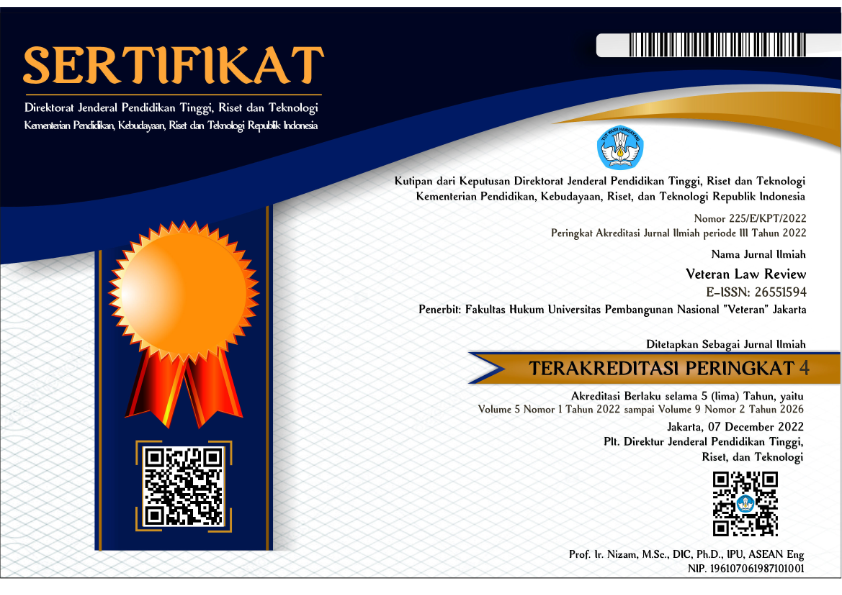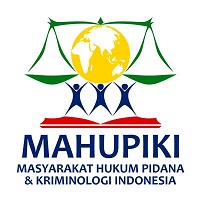Community Based Forest Management License: The Urgency of Forest Management for Human Development in Indigenous Peoples
DOI:
https://doi.org/10.35586/velrev.v6i1.4686Keywords:
Indigenous Peoples (MHA), Customary Forest, Community Based Forest Management,Abstract
The position of customary law communities ' property rights (MHA) over customary forests has not been fully protected by law which causes conflicts regarding customary forests. Weak legal protection leads to discrimination for MHA, namely by loss of residence, loss of agricultural land, and even leading to punishment for defending its rights. In fact, the existence of Indigenous Peoples has been guaranteed in the constitution, namely in Article 18B of the 1945 NRI Constitution. However, in reality, the problem of property rights to customary forests is still often encountered and even boils down to human rights violations, namely the criminalization of Indigenous Peoples who are fighting for their rights. The postulate gives rise to two formulations of the problem. First, what are the problems with forest management regulation on the protection and empowerment of Indigenous Peoples? Second, How is the concept of forest management that protects and empowers Indigenous Peoples in accordance with the ius constituendum? To answer this problem, the author recommends improvements related to existing arrangements and the establishment of government policies as a concrete effort in enforcing the rights of MHA. Existing laws must provide protection and protection of the human rights of indigenous peoples and be accompanied by customary forest management based on the Community Based Forest Management (CBFM) License as a mechanism in settlement and to protect and implement MHA.Downloads
References
Books
Amiruddin and Asikin. Z, 2012, Pengantar Metode Penelitian Hukum, Ctk. Keenam, Jakarta: Rajawali Pers
Asshiddiqie. J, 2003, Konsolidasi Naskah UUD 1945, Jakarta: Penerbit Yarsif Watampoe
Guiang. E.S, et al, 2001, “Community-Based Forest Management in the Philippines: A Preliminary Assessment”, Manila: Institute pf Phillippine Culture Ateneo De Manila University
Hadjon. P.M, 1987, Perlindungan Hukum Bagi Rakyat Indonesia: Sebuah Studi Dengan Prinsip-prinsipnya, Penanganannya oleh Pengadilan dalam Lingkungan Peradilan Umum dan Pembentukan Peradilan Administrasi Negara, Surabaya: Bina Ilmu
Heroepoetri. A, et al, 2016, Pelanggaran Hak Perempuan Adat dalam Pengelolaan Kehutanan-Laporan Komisi Nasional Nasional Anti Kekerasan terhadap Perempuan (Komnas Perempuan) untuk Inkuiri Nasional Komnas HAM: Hak Masyarakat Hukum Adat atas Wilayahnya di Kawasan Hutan, Jakarta: Komisi Nasional Hak Asasi Manusia Republik Indonesia
Ibrahim Johny, 1984, Teori dan Metodologi Penelitian Hukum Normatif, Malang: Bayumedia
Mamudji. S, et al, 2005, Metode Penelitian dan Penelitian Hukum, Depok: Fakultas Hukum Universitas Indonesia
Marzuki. P.M, 2008, Penelitian Hukum, Ctk kedua, Jakarta: Kencana
------------------, 2005, Penelitian Hukum: Edisi Revisi, Jakarta: Kencana Prenada Media Group
Moniaga. S, et al, 2016, Konflik Agraria Masyarakat Hukum Adat Atas Wilayahnya di Kawasan Hutan¸ Jakarta: Komisi Nasional Hak Asasi Manusia Republik Indonesia
Nuraini. A, et al, 2016, Ringkasan Temuan dan Rekomendasi untuk Perbaikan Hukum, dan Kebijakan tentang Penghormatan, Perlindungan, Pemenuhan, dan Pemulihan Hak Masyarakat Hukum Adat atas Wilayahnya di Kawasan Hutan, Jakarta: Komisi Nasional Hak Asasi Manusia Republik Indonesia
Rahardjo. S, 2006, Ilmu Hukum, Bandung: Citra Aditya Bakti
---------------, 2000, Ilmu Hukum, Bandung: Citra Aditya Bakti
Sunggono. B, 2003, Metode Penelitian Hukum, Cet 5, Jakarta: RajaGrafindo Persada
Soekanto. S and Mamudji. S, 2001, Penelitian Hukum Normatif, Jakarta: Rajawali Pers
Tim Inkuiri Nasional Komnas HAM, 2016, Inkuiri Nasional Komisi Hak Asasi Manusia: Hak Masyarakat Hukum Adat Atas Wilayahnya di Kawasan Hutan, Jakarta: Komisi Nasional Hak Asasi Manusia Republik Indonesia
Ubbe. A, et al , 2013, Penelitian Hukum Tentang Peran Masyarakat Hukum Adat Dalam Penanggulangan Pembalakan Liar, Jakarta: Badan Pembinaan Hukum Nasional Kemenkumham RI
Journal Articles
Aminah, 2011, Pengelolaan Hutan Berbasis Masyarakat (PHBM) Sebagai Upaya Pengakuan Hak Masyarakat Adat, Pranata Hukum, Vol. 6, No. 1, pp. 21-30
Djamin. R, 2012, Membangun Konstruksi Hukum Indonesia Di Atas Pondasi Pancasila, Jurnal Ilmu Hukum, Vol.15, No.1, pp. 54-70
Helmi. M.I, 2013, Penerapan Azas “Equality Before The Law’” Dalam Sistem Peradilan Militer, Jurnal Cita Hukum, Vol. I No. 2, pp. 303-316
Kusniati. R, 2011, Integrasi Standar Perlindungan, Penghormatan, Dan Pemenuhan HAM Dalam Tugas Dan Fungsi Satuan Kerja Perangkat Daerah, Jurnal Ilmu Hukum, Vol. 2 No. 1, pp. 79-98
Maula. B.S, 2018, The Role of Judicial Review In Protecting Religious Minority Rights In Indonesia, Veteran Law Review, Vol. 1 (1), pp 1-19
Manarisip. M, 2012, Eksistensi Pidana Adat Dalam Hukum Nasional, Lex Crimen, Vol. I No. 4, pp. 24-50
Matuankotta. J.K, 2018, “Peran Aktif Masyarakat Hukum Adat Dalam Pembangunan Ekonomi”, SASI, Vol. 24, No.2, , pp. 101-113
Primawardani. Y, 2017, Perlindungan Hak Masyarakat Adat dalam Melakukan Aktivitas Ekonomi, Sosial dan Budaya di Provinsi Maluku” Jurnal HAM, Vol.8 No.1, pp. 1-11
Pulhin. J.M, et al, 2007, “Three decades of community-based forest management in the Philippines: emerging lessons for sustainable equitable forest management”, International Forestry Review, Vol. 9 No.4, pp. 865-883
Rawls. J, 1985, “Justice as Fairness: Political not Metaphysical”, Philosophy and Public Affairs, Vol. 14 No. 3, pp. 223-251
Rosalina, 2010, Eksistensi Hak Ulayat Di Indonesia, Jurnal Sasi, Vol. 16 No. 3, pp. 44-51
Sugiswati. B, 2012, Perlindungan Hukum Terhadap Eksistensi Masyarakat Adat di Indonesia, Perspektif, Vol. XVII, No. 1, pp. 31- 43
Setiawan, M B, dan Hakim. A, 2013, Indeks Pembangunan Manusia, Jurnal Economia, Vol.9, No. 1, pp. 18-26
Syamsudin. M, 2008, Beban Masyarakat Adat Menghadapi Hukum Negara, Jurnal Hukum, Vol.15, No.3, pp. 338-351
Widiangela. A, et al, 2021, Analisis Yuridis Problematika Pengakuan Masyarakat Hukum Adat Kinipan, Jurnal Hukum Lex Generalis, Vol.2, No.3, pp. 1-24
Winanti. A, et al, 2019, Access to Justice: In Considering Losses of Giving the Right of Exploitation (Studies in Mesuji Lampung), Veteran Law Review, Vol. 2 (2), pp. 21-29
Report
AMAN, 2020, Catatan Akhir Tahun 2020 Aliansi Masyarakat Adat Nusantara, Resiliensi Masyarakat Adat di Tengah Pandemi Covid 19: Agresi Pembangunan dan Krisis Hak Asasi Manusia (HAM Dicey. A.V, 2007, Pengantar Studi Hukum Konstitusi, terjemahan Introduction to the Study of The Law of the Constitution, penerjemah Nurhadi, Bandung: Nusamedia
AMAN, 2021, Laporan Catatan Akhir Tahun 2021 Aliansi Masyarakat Adat Nusantara: Tangguh Di Tengah Krisis, https://www.aman.or.id/organization-document/catatan-akhir-tahun-aman-2021:-tangguh-di-tengah-krisis
Muchsin, 2003, Disertasi : “Perlindungan dan Kepastian Hukum bagi Invenstor di Indonesia”, Fakultas Hukum, Universitas Sebelas Maret, Surakarta
Website Materials
Bappeda, 2016, “Makna, Hakikat, Tujuan Pembangunan Nasional”, Pemerintah Kabupaten Buleleng Bappeda, Retrieved in 27 July, 2022 from https://bappeda.bulelengkab.go.id/informasi/detail/artikel/makna-hakikat-tujuan-pembangunan-nasional-49
Direktorat Jenderal Pengendalian Perubahan Iklim, Mengakui Hutan Adat dan Masyarakat Adat, Ditjenppi. Menlhk, Retrieved 25 July, 2022 from http://ditjenppi.menlhk.go.id/dari-media/368-mengakui-hutan-adat-dan-masyarakat-adat.html?fbclid=IwAR0Em59HXuLgx-6SRFRLlOSOiUQG_rGCVKHMzDOplWwXjKruNiqCyLW0s08
Direktorat PKTHA, pskl.menlhk.go.id, Retrieved 27 July, 2022 from http://pskl.menlhk.go.id/pktha/pengaduan/frontend/web/index.php?r=site%2Fdirektorat-pktha
Kabar Latuharhary, 2020, Masyarakat Adat Pubabu Kembali Mengadu ke Komnas HAM, komnasham.go.id, Retrieved 27 July, 2022 from https://www.komnasham.go.id/index.php/news/2020/8/10/1517/masyarakat-adat-pubabu-kembali-mengadu-ke-komnas-ham.html
Nurhayati. F, Masyarakat Adat dan Konflik, 2021, katadata.co.id, Retrieved 26 July, 2022 from https://katadata.co.id/padjar/infografik/60176fce4fa52/masyarakat-adat-dan-konflik
Soemardjono. M.S.W, 2021, Konflik Agraria Tak Kunjung Usai, kpa.or.id, Retrieved 27 July, 2022 from http://kpa.or.id/media/baca2/opini/69/Konflik_Agraria_Tak_Kunjung_Usai/
Utami. S, 2020, 60% Substansi RUU Masyarakat Hukum Adat Bermasalah, Media Indonesia, Retrieved 19 July, 2022 from https://mediaindonesia.com/politik-dan-hukum/342462/60-subtansi-ruu-masyarakat-hukum-adat-bermasalah
Wamafma, N, 2020, Industri Sawit Rampas Hutan dan Ruang Hidup Masyarakat Adat Papua, Greenpeace, Retrieved 21 July, 2022 from https://www.greenpeace.org/indonesia/cerita/4840/industri-sawit-rampas-hutan-dan-ruang-hidup-masyarakat-adat-papua/
Yoshio. A, 2020, “CBFM, Solusi Kesejahteraan dan Kelestarian Alam Papua”, katadata.co.id, Retrieved 29 July, 2022 from https://katadata.co.id/ariemega/infografik/5fd8240954775/cbfm-solusi-kesejahteraan-dan-kelestarian-alam-papua
Statutory
Putusan MK No. 35/PUU-X/2012
Rancangan Undang-Undang Masyarakat Adat
Undang-Undang Nomor 41 Tahun 1999 tentang Kehutanan, LN No. 167, TLN No. 3888
Undang-Undang Nomor 39 Tahun 1999 tentang Hak Asasi Manusia, LN. 165, TLN. 3886
Statutory from Abroad
Department Environment and Natural Resources Orders No. 96-29
Indigenous People’s Rights Act (Republic Act No. 8371)
Downloads
Published
How to Cite
Issue
Section
License
Copyright (c) 2023 Veteran Law Review

This work is licensed under a Creative Commons Attribution-ShareAlike 4.0 International License.
Copyright (c) 2022 Veteran Law Review Journal
Veteran Law Review © 2022 by Faculty of Law Universitas Pembangunan Nasional "Veteran" Jakarta is licensed under Creative Commons Attribution 4.0 International

1. License
The non-commercial use of the article will be governed by the Creative Commons Attribution license as currently displayed on Creative Commons Attribution 4.0 International.
2. Author(s)' Warranties
The author warrants that the article is original, written by the stated author(s), has not been published before, contains no unlawful statements, does not infringe the rights of others, is subject to copyright that is vested exclusively in the author, and free of any third party rights, and that any necessary written permissions to quote from other sources have been obtained by the author(s).
3. User/Public Rights
VELREV's spirit is to disseminate articles published are as free as possible. Under the Creative Commons Attribution-ShareAlike 4.0 International License. VELREV permits users to copy, distribute, display, and perform the work for non-commercial purposes only. Users will also need to attribute authors and VELREV to distributing works in the journal and other media of publications.
4. Rights of Authors
Authors retain all their rights to the published works, such as (but not limited to) the following rights;
- Reproduce the work
- Prepare derivative works based upon the work
- Distribute copies of the work
- Perform the work publicly
- Display the work publicly
- Copyright and other proprietary rights relating to the article, such as patent rights,
- The right to self-archive the article,
- The right to enter into separate, additional contractual arrangements for the non-exclusive distribution of the article's published version (e.g., post it to an institutional repository or publish it in a book), with an acknowledgement of its initial publication in this journal (Veteran Law Review).
5. Co-Authorship
If the article was jointly prepared by more than one author, any author submitting the manuscript warrants that he/she has been authorized by all co-authors to be agreed on this copyright and license notice (agreement) on their behalf, and agrees to inform his/her co-authors of the terms of this policy. VELREV will not be held liable for anything that may arise due to the author's internal dispute. VELREV will only communicate with the corresponding author.
6. Royalties
Being an open accessed journal and disseminating articles for free under the Creative Commons license term mentioned, author(s) are aware that VELREV entitles the author(s) to no royalties or other fees.
7. Miscellaneous
VELREV will publish the article (or have it published) in the journal if the article’s editorial process is successfully completed. JOSI's editors may modify the article to a style of punctuation, spelling, capitalization, referencing, and usage that deems appropriate. The author acknowledges that the article may be published so that it will be publicly accessible and such access will be free of charge for the readers as mentioned in point 3.

















